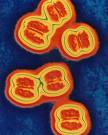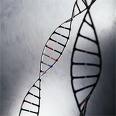Genetics And Expression: The Co-Evolution of Neisseria Meningitidis and Possible Hosts

-The bacteria Neisseria Meningitidis is more likely to thrive in a healthy host asymptomatically.
-The majority of N. Meningitidis bacteria that resides in the body does not cause disease.
-When the bacteria begin to release toxins and cause disease, the amount of time they have to transmit themselves to a new host is shortened.
-Most of the bacteria in the cerebrospinal fluid cannot be transferred to new hosts.
-Virulence factors must evolve for some other reason than to cause disease in the host.
Selective Pressures and Phase Shifting

The Bacteria N. Meningitidis must evolve due to specific selective pressures placed upon it:
-The ability to colonize a diverse population of hosts. (As the host population evolves, so must the bacteria in order to colonize these hosts).
-The abilty to avoid the defenses of these hosts.
-The ability to be transferred to new hosts.
Phase Shifting:
-A genetic process called "phase shifting" has evolved in response to the bacteria's need to colonize diverse hosts.
-Certain genes rapidly mutate in order to meet the demands of each particular host body.
-This process activates molecules that are necessary for colonizing, but also virulence factors.
-The posibility for disease increases as well as the possibility for colonization. This is why the disease progresses so quickly.
-The bacteria also places pressures on the host.
Sources Used:

